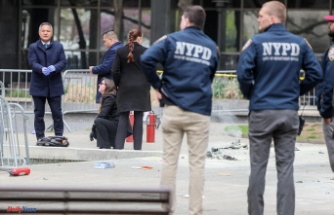Officials said Wednesday that Taliban commanders have seized three more provincial capitals and an army headquarters in Afghanistan. This blitz leaves nearly two-thirds the country under their control as the U.S. ends its two-decade-long war. The day before, President Joe Biden urged Afghans to "fight against themselves, fight for the nation."
Some Taliban commanders may have been more restrained in newly captured territory than others, but rights groups claim that others behaved much like the brutal Taliban the U.S. overthrew back in 2001. This includes the alleged mass murder of detainees and demanding that they be provided with females over 15 years old to marry, an allegation denied in a Taliban spokesperson.
Officials from the Biden administration have maintained their hope that Taliban actions might be influenced by international approval. Zalmay Khalilzad, the U.S. ambassador for Afghanistan, traveled to Qatar this week in order to directly make this point to Taliban officials. He told Voice of America that if they take over Afghanistan by force, "they will become an Islamic pariah state."
Officials in the Administration reject criticism from Senator Minority Leader Mitch McConnell (R-Ky.), who opposes withdrawal and dismissed what he called "diplomatic carrots."
No matter whether the Talibanheed that warning, Biden doesn't seem to be slowing down or reverseing his decision to withdraw from war.
Under a deal President Donald Trump made with the Taliban in 2020, the United States will end its almost 20-year-old combat mission in Afghanistan on August 31. Invasion by the United States began in October 2001 and ended the al-Qaida, which was based in Afghanistan. This group had been responsible for the September 11 attacks. With Afghan allies, it overthrew the Taliban government, which had refused to give Osama Bin Laden.
Only Pakistan, Saudi Arabia, and the United Arab Emirates recognised the old Taliban government. Inward-looking rulers imposed the strictest interpretation of Islamic law. This included banning entertainment such as singing and watching TV. They held public hangings at Kabul’s main sports stadium.
Mullah Mohammed Omar, the then-Taliban ruler, made an act of kindness to the international community by ending heroin cultivation. This was confirmed by U.N officials. Omar said to his ruling council that he believed his government was unable to end international condemnation.
Omar's Taliban council members at that time acknowledged the financial pain the sanctions were causing.
According to Andrew Watkins (an analyst for the International Crisis Group), U.S. talks of international inclusion, aid, and reconstruction money may have been more important for today's Taliban than if they had come even a few decades ago.
Today, the U.S. withdrawal has given the Taliban an opportunity to grow. International support is less important because of the possibility of seizing all or part of Afghanistan.
Watkins stated that the Taliban's political representatives expressed genuine interest in international legitimacy, and all its benefits, during talks in Qatar. He said that the Taliban did not show a willingness to compromise their behavior in order to secure any international recognition or financial support.
Carter Malkasian, an Afghanistan expert who advised Gen. Joseph Dunford (then-Joint Chiefs of Staff Chairman) during the U.S. - Taliban talks, said that the possibility of the world recognising the Taliban as Afghanistan’s legitimate government if they succeed "is a benefit to them."
Malkasian, author "The American War in Afghanistan: History", stated that "But, that's not likely to cause them to offer any kind of large scale concessions."
Malkasian stated that this hope of legitimacy could help the Taliban to behave better during and after the battle, so they don't repeat the worst past abuses.
Officials from Pakistan who have had private conversations with the insurgent movement tell us that they want total power as the political leaders discuss compromise and power-sharing. They envision a strict religious government that accepts girls working and allows them to go to school, according to their Islamic injunctions. Because of the sensitive nature of the topic, the Pakistani officials spoke under anonymity.
European diplomats are less skeptical than Americans about the possibility that international opinion could influence the Taliban. Afghanistan's president is also skeptical.
Ashraf Ghani said to his Cabinet that they had changed but not positively. He rushed to Balkh, which was already surrounded by Taliban-held territory.
Ghani stated that the Taliban are now "more cruel and more oppressive."
The Taliban gained legitimacy when black-turbaned officials signed the U.S. withdrawal agreement with Trump officials. Officials from the Taliban have been calling upon diplomats in Russia, China and Central Asian governments to ensure that they can maintain economic and trade ties, if not worldwide.
The Taliban are largely honoring one of the key parts of their agreement with Trump and holding off attacks on U.S. forces withdrawing from Afghanistan.
The core requirement of the deal is that the Taliban cannot allow al-Qaida, or any other group to use Afghanistan to harm the United States and its allies again.
An April Pentagon report stated that the Taliban had "mutually beneficial" relationships with al-Qaida-related organizations, but it was unlikely that the militia would take any substantive action against them.
Jennifer Brick Murtazashvili is an associate professor at University of Pittsburgh and a former U.S. official in Central Asia.
She said that the Taliban "don’t really have an incentive" unless their plans for governing have changed. "I believe there was a lot wishful thinking that the Taliban had improved, you know, in their fundamental sense."












